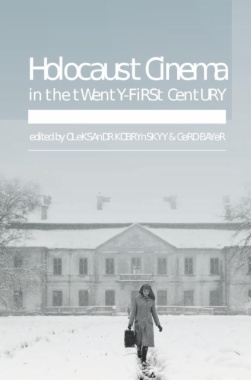In the first fifteen years of the twenty-first century, a large number of films were produced in Europe, Israel, the United States, and elsewhere addressing the historical reality and the legacy of the Holocaust. Contemporary Holocaust cinema exists at the intersection of national cultural traditions, aesthetic conventions, and the inner logic of popular forms of entertainment. It also reacts to developments in both fiction and documentary films following the innovations of a postmodern aesthetic. With the number of witnesses to the atrocities of Nazi Germany dwindling, medialized representations of the Holocaust take on greater cultural significance. At the same time, visual responses to the task of keeping memories alive have to readjust their value systems and reconsider their artistic choices.
Both established directors and a new generation of filmmakers have tackled the ethically difficult task of finding a visual language to represent the past that is also relatable to viewers. Both geographical and spatial principles of Holocaust memory are frequently addressed in original ways. Another development concentrates on perpetrator figures, adding questions related to guilt and memory. Covering such diverse topics, this volume brings together scholars from cultural studies, literary studies, and film studies. Their analyses of twenty-first-century Holocaust films venture across national and linguistic boundaries and make visible various formal and intertextual relationships within the substantial body of Holocaust cinema.
- Table of Contents
- Notes on Contributors
- Introduction: The Next Chapter in the History of Holocaust Cinema, by Oleksandr Kobrynskyy and Gerd Bayer
- Part One: The Past and Its Presence
- 1. Transformations of Holocaust Memory: Frames of Transmission and Mediation, by Aleida Assmann
- 2. Supplementing Shoah: Claude Lanzmann’s The Karski Report and The Last of the Unjust, by Sue Vice
- 3. The Act of Digging: Archaeology, Photography and Forensics in Birthplace and Holocaust by Bullets, by Brad Prager
- 4. The Willing Amnesia: The Holocaust in Post-Soviet Cinema, by Olga Gershenson
- 5. Wilhelm Brasse’s Photographs from Auschwitz: Testimony and Photography in Irek Dobrowolski’s The Portraitist, by Tomasz Łysak
- Part Two: The Ethics of Memory
- 6. The Singular Jew: Representing National Socialism’s Jewish Victims in Recent Historical Cinema, by Jennifer M. Kapczynski
- 7. Locked Doors and Hidden Graves: Searching the Past in Pokłosie, Sarah’s Key and Ida, by Tobias Ebbrecht-Hartmann
- 8. The Ethics of Perspective and the Holocaust Archive: Spielberg’s List, The Boy in the Striped Pyjamas and Fateless, by Martin Modlinger
- Part Three: The Legacy of Evil
- 9. ‘The Doctor is Different’: Ambivalent Ethics, Cinematic Heroics and the Figure of the Jewish Doctor in Tim Blake Nelson’s The Grey Zone, by Erin McGlothlin
- 10. On the Cinematic Nazi, by Aaron Kerner
- 11. The Holocaust as Case Study: Universalist Rhetoric and National Memory in Stefan Ruzowitzky’s Radical Evil, by Oleksandr Kobrynskyy
- 12. TV as a Historical Archive? How Epic Family Series Memorialise the Holocaust, by Marcus Stiglegger
- Index

